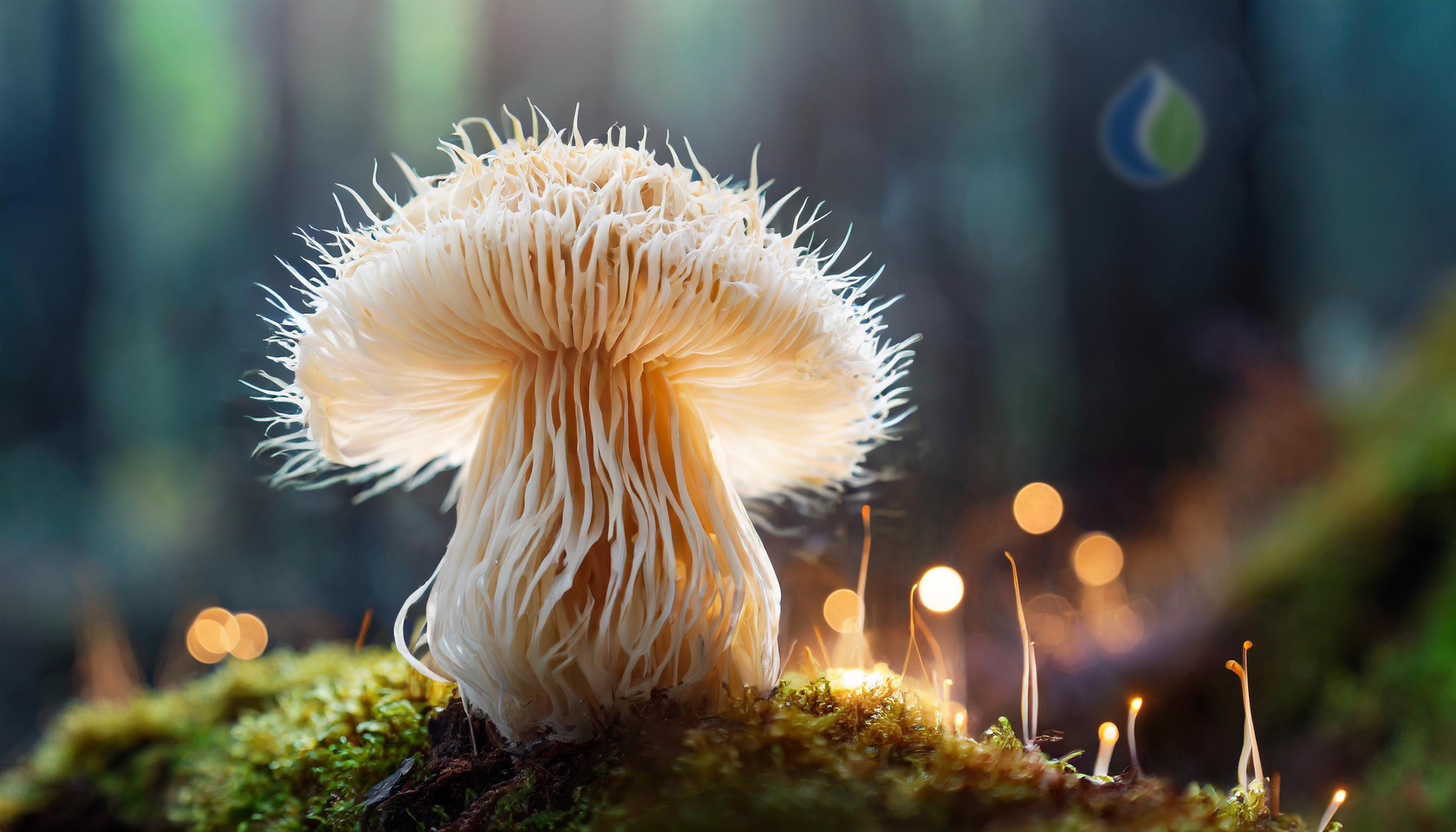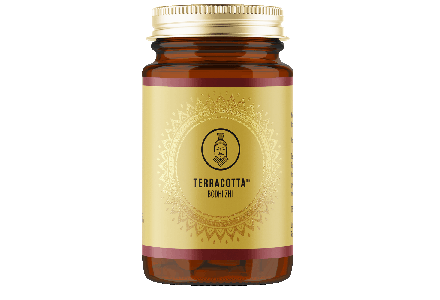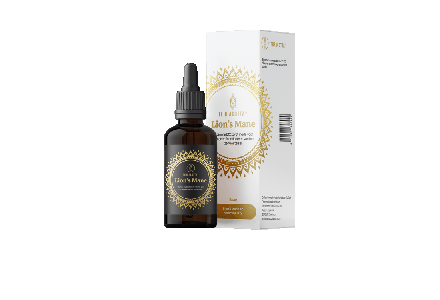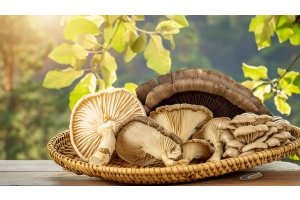
Welcome to our blog about Lion's Mane, also known as the bearded tooth mushroom. Lion's Mane can be considered one of the medicinal mushrooms, and it's no secret that these mushrooms have been used for centuries in various cultures for their potential medicinal properties. Lion's Mane may have positive effects on your well-being, although more research is needed. In this blog, we will expand your knowledge about the fascinating world of medicinal mushrooms, especially Lion's Mane.
What is Lion's Mane
Lion's Mane, also known as the bearded tooth mushroom, is scientifically known as Hericium erinaceus. It is an edible mushroom with medicinal properties. There are more medicinal mushrooms, like Lion's mane, that are sold by Meditech Europe (link to general product page), and each has its own unique properties and possible applications. For more information, see this blog.
Lion's Mane is known for its unique appearance, with white spines that resemble the mane of a lion, hence the name. The mushroom has a long history of use in traditional Chinese and Japanese medicine. It was seen by them as a valuable mushroom with potential medicinal properties. In addition, Lion's Mane was also considered an edible mushroom and thus a potential food source in both traditions.
Traditional Applications
In traditional Chinese medicine, Lion's Mane has been used for centuries for various medical purposes. It is known under the name "Hou Tou Gu" in Chinese, which can be literally translated as "monkey head mushroom". It was historically considered a tonic for the digestive system and as a means to promote general health and vitality.
In traditional Japanese medicine, known as "Kampo", Lion's Mane was also used for various health purposes. It is known as "Yamabushitake" in Japanese, which can be translated as "mountain monk mushroom". This name is derived from the resemblance of the mushroom to the beard of a mountain monk. Lion's Mane was historically used in Japan for gastrointestinal problems and as a tonic for the digestive system. It was also valued for possible neurological benefits.
In both traditions, Lion's Mane was not only considered a food source but also a mushroom with medicinal properties. It was used as an adaptogen, meaning it would help balance the body and respond to stressful situations. Due to the alleged positive effects on the nervous system, Lion's Mane was often used to support cognitive functions, such as memory and concentration.
Current Research and Applications
While the historical applications of Lion's Mane in traditional medicine are valuable, current scientific research is mainly focused on exploring and confirming the potential health benefits, such as neuroprotection and anti-inflammatory effects.
Some key points regarding current research into Lion's Mane are:
- Cognitive function: Lion's Mane has received attention for its possible neuroprotective effects. Some studies suggest it could promote the production of nerve growth factor (NGF), which could support brain health and cognitive function.
- Memory and concentration: There is some evidence that Lion's Mane can have positive effects on memory and concentration. However, more research is needed to confirm these benefits definitively.
- Anti-inflammatory properties: Lion's Mane has been studied for its possible anti-inflammatory and antioxidative properties, which could contribute to overall health and balance.
The research into Lion's Mane is still in the early stages, and while it appears promising in various areas, more studies are needed to fully understand the potential benefits and mechanisms of action.
Culinary Use
Lion's Mane is edible and can be used in various culinary dishes. It has a mild, seafood-like flavor and a unique texture, making it popular in vegetarian and vegan recipes. It can be sautéed, roasted, or used in soups and stews. The texture of Lion's Mane is remarkably fibrous and juicy. When prepared, it retains its unique structure, making it an interesting addition to various dishes. It is nutritious and contains a reasonable amount of protein while being low in carbohydrates. It also contains some healthy fats such as linoleic acid and oleic acid. Additionally, this mushroom is a good source of several B-vitamins, minerals such as potassium, phosphorus, zinc, and selenium, and various antioxidants.
In addition to culinary use, you can also use Lion's Mane extracts or supplements to incorporate the potential health benefits into your diet.
Lion's Mane Supplements
Lion's Mane is available in various forms, including capsules, powders, and liquid extracts, intended as dietary supplements. Meditech Europe offers Lion's Mane in the form of a tincture. This tincture embraces the power of this remarkable mushroom and enhances it with vitamin B12. Vitamin B12 is essential for metabolism, the formation of red blood cells, and is often associated with healthy nerve function. The synergy between Lion's Mane and vitamin B12 creates a harmonious blend aimed at supporting your well-being. Harvesting the Lion's Mane for this tincture requires careful attention, as this fungus usually grows on old and living trees. Preserving these delicate ecosystems is vital to ensure the mushroom's future.
Use and Safety
For safe use and to fully benefit from the advantages, there are a number of guidelines. Stick to the recommended dosage on the packaging and do not exceed it. Be cautious and do not take the tincture if you are allergic to mushrooms. Always remember that our mushroom products, such as Lion's Mane, are natural dietary supplements. They are a supplement to, but not a replacement for, a varied, balanced diet and a healthy lifestyle. As with any supplement, it is advisable to consult a health professional before adding Lion's Mane or its extracts to your routine, especially if you have underlying health issues or are taking medication.
Conclusion
Medicinal mushrooms like Lion's Mane are a fascinating subject with a rich history and promising health benefits. Therefore, we find it important to create awareness about the potential of these natural resources. We hope this blog has helped you gain a better understanding of Lion's Mane and their impact in the past and present on well-being and health.
Meditech Europe is ready to advise and guide you in discovering the world of mushroom products and their potential benefits. Our Orthomolecular Therapist, Cynthia, is happy to speak with you and support you in this quest. You can contact us via info@meditecheurope.nl or +31527 292 331.






